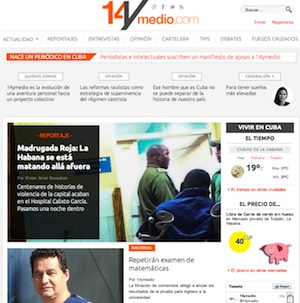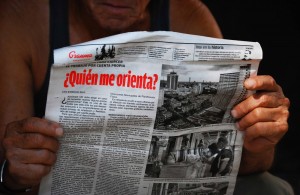ALGUNAS NOTAS SOBRE LOS PROBLEMAS EN LOS MEDIOS DE COMUNICACIÓN/PRENSA EN CUBA.
Para que tengamos una prensa libre de ataduras burocráticas y prejuicios políticos en Cuba, se precisa de una democratización del poder político.
Muchas son las quejas de que la prensa oficial cubana no cumple con sus funciones informativas. Unas veces se culpa a la incapacidad de los periodistas, a su falta de sagacidad, o a su falta de empuje para criticar las cosas mal hechas o aportar soluciones a los problemas que afectan a la población.
Sin embargo, en la historia del último medio siglo no han faltado los periodistas audaces y agudos que con mucha profesionalidad han señalados los males de Cuba y han aportado ideas y sugerencias. Que no se les haya hecho caso, que se les haya relegado, son cosas distintas.
En otras ocasiones la culpa recae en los burócratas intermedios “que no quieren dar información” sobre los problemas que tratan de investigar los periodistas: el famoso “secretismo” criticado por el propio Raúl Castro, quien junto a la tradicional cúpula gobernante han sostenido todos esos candados y censuras que perduran ya por más de medio siglo, siempre esgrimidos para proteger la seguridad del estado o evitar que el “enemigo” use la información contra la “revolución”.
El periodismo cubano oficial ha sido víctima de ese enfoque y de la filosofía de “ciudadela sitiada” esgrimida por el poder para auto-conservarse y justificar la censura y la represión del pensamiento diferente. Ante el imperio descomunal de la hegemonía tradicional, la autocensura –la peor de todas- ha sido una forma de supervivencia, también es cierto.
Sin embargo, el problema fundamental de la prensa en Cuba, reside en la lógica de un sistema de gobierno y economía integrados, donde los detentadores del poder político, la siempre misma dirección del único Partido, son también los dirigentes-empresariales del poder económico y quiénes controlan las políticas de los medios de difusión.
La economía centralizada y planificada del “socialismo estatal” pretende funcionar como una mega empresa nacional, administrada por el mismo poder político central. En tales circunstancias, la prensa admitida oficialmente -que también está financiada por ese poder- tiene como finalidad principal defender tales intereses y, en todo caso, a hacer críticas para hacer funcionar mejor lo ya establecido, nunca para cambiarlo.
En los países capitalistas los grandes medios están en manos de grandes expresas capitalistas, también vinculadas o financiadas por el gran capital y, desde luego, su principal fin es defender los intereses a los que responden, al tiempo que la libertad que proporciona Internet y las nuevas tecnologías de la comunicación, no pueden impedir la difusión del pensamiento diferente.
En Cuba el gobierno controla los medios tradicionales y a la vez limita el flujo de información por la red de redes, e impide el amplio acceso popular. No obstante, la prensa alternativa y la blogosfera cubana han ido presentando un reto creciente a la prensa oficial. Debe reconocerse que ante la crítica y la presión interna e internacional, últimamente, el gobierno ha dado modestos pasos positivos, como ampliar el limitado y carísimo acceso a internet y permitir algunos comentarios de enfoques diferentes en las versiones digitales de los medios oficiales.
La crítica periodística que se ha propuesto un cambio en el sistema político-económico, no importa si a la derecha o a la izquierda, ha tenido que terminar en los medios alternativos, porque los oficiales no les han abierto espacio.
Cuando algún periodista u órgano de prensa transgrede intereses establecidos, de alguna manera es censurado, castigado, suspendido o hasta expulsado. Es lo mismo que pasa a los burócratas intermedios que brindan a la prensa una información o un criterio que contraviene los intereses de “arriba”, causa de que muchos evaden, omitan o tergiversen demandas de la prensa.
Esto, para no hablar de la represión al periodismo disidente, siempre acusado de “mercenario” o de servir al “enemigo”, como si no tuviera intereses propios; sin descartar que existan plumas que solo se muevan al compás del dinero, algo que podemos encontrar en cualquier campo político.
 NUEVO PERIODICO DIGITAL INDEPENDIENTE 14YMedio.com
NUEVO PERIODICO DIGITAL INDEPENDIENTE 14YMedio.com
Hay “razones de estado”, para ocultar informaciones, económicas y políticas, cuando no estrechos intereses de administraciones intermedias. Por ejemplo, “hay que preservar la imagen pública de los dirigentes, de su dedicación a los intereses del pueblo”. “Hay que justificar que los recursos necesarios para enfrentar los problemas locales estén en manos superiores, centralizados para su mejor uso”. O, hay que mentir sobre el cumplimiento del plan para seguir en el cargo.
También “hay que evitar que la prensa extranjera se entere de las epidemias porque eso puede reducir el número de turistas internacionales que vienen, hay que mantener la propaganda de potencia médica para seguir exportando médicos”. “Hay que demostrar que la oposición es mínima”. Y así por el estilo, todo ese secretismo, todas esas prohibiciones, tienen “razones de estado” o burocráticas.
En fin, mientras tengamos un estado absoluto por encima de los intereses del pueblo, de los trabajadores, de los ciudadanos y las comunidades, donde los de arriba “eligen” a los de abajo, cuando debiera ser al revés, estaremos en las mismas.
Una ley de prensa podría dar solución a muchos de estos problemas, si fuera hecha bajo principios democráticos, con participación abierta, horizontal y no censurada de los periodistas, todos, sin exclusiones por razones políticas e ideológicas, por los que creen en la necesidad de que la prensa no se subordine a poderes establecidos y luche por decir la verdad.
Pero hasta ahora el gobierno se ha negado a discutir esa ley e incluso rechazó la propuesta en el último Congreso de la UPEC, demostrando su falta de interés en la libertad de expresión y prensa.
Para que tengamos una prensa libre de ataduras burocráticas y prejuicios políticos en Cuba, capaz de generar procesos investigativos que no puedan ser obstaculizados por los poderes fácticos y puedan no solo informar con la mayor objetividad, sino difundir también puntos de vistas distintos a los del gobierno, se precisa de una democratización del poder político en Cuba.
Los artistas del teatro y los plásticos cubanos han ganado espacios de libertad a puro coraje, igual que algunos músicos y cantantes. Los cineastas cubanos han plantado batalla por su libertad de creación y por un cine libre de imposiciones. Los escritores y poetas libran escaramuzas. Los periodistas se han quedado rezagados.
La batalla por la libertad de expresión y prensa es muy difícil en un país tan centralizado. Lo evidencia la reciente polémica en torno a unas declaraciones del laureado escritor Leonardo Padura, “acusado” por algunos colegas suyos de no citar las agresiones y el bloqueo imperialista al referirse a los problemas de Cuba, de dar declaraciones a un órgano de prensa reaccionario extranjero y de opinar injustamente sobre la dependencia estatal de parte de la intelectualidad.
Los interesados en que exista esa prensa libre y responsable en Cuba, no importa su ideología, también tendrán que poner en primer plano la lucha por la democratización del sistema político.
Kaos/Agencies/PedroCampos/InternetPHotos/www.thecubanhistory.com
NOTES ABOUT THE PROBLEMS WITH THE MEDIA/PRESS IN CUBA NOW.
The Cuban History, Hollywood.
Arnoldo Varona, Editor
Calles de Remedios, Las Villas. (Cuba en Fotos).

NOTES ABOUT THE PROBLEMS WITH THE MEDIA/PRESS IN CUBA NOW.
To have a free press without political ties and bureaucratic prejudices in Cuba , is needed democratization of political power.
There are many complaints that the official Cuban press does not comply with the reporting functions. Sometimes they blame the inability of journalists to their lack of wisdom , or lack of push things to criticize shoddy or provide solutions to the problems affecting the population.
However, in the history of the last half century there have been bold and sharp with great professionalism journalists have mentioned the evils of Cuba and contributed ideas and suggestions. That has not been done to them, has been relegated them are different things.
At other times the fault lies with the intermediate bureaucrats ” who do not want to give information” about the problems that journalists try to investigate : the famous ‘secrecy’ criticized by President Raul Castro himself , who along with the traditional ruling elite have held all padlocks and censures those who already endure for over half a century , always put forward to protect the security of the state or prevent the ” enemy ” use the information against the “revolution” .
The official Cuban media has been the victim of such an approach and philosophy of ” fortress under siege ” to the power wielded by self- maintained and justify censorship and repression of different thought . Given the enormous empire of the traditional hegemony , self-censorship – the worst of all , has been a way of survival , it is also true .
However, the fundamental problem of the press in Cuba , lies in the logic of an integrated system of government and economy, where the holders of political power, always same direction of the sole party , are also business leaders , and economic power who control the policies of the media .
The centrally planned “state socialism” economy is intended to function as a mega national company , run by the same central political power. In such circumstances , the press – which officially supported is also funded by that power – primarily aims to defend such interests and , if anything, to do to run better reviews already established , never to change .
In capitalist countries the mainstream media are in the hands of large capitalists express also linked or funded by big business and , of course, its main purpose is to defend the interests to which they respond , while providing Internet freedom and new communication technologies , can not prevent the spread of different thought .
In Cuba the government controls the mainstream media and also limits the flow of information through the network of networks , and prevents the broad popular access . However, the alternative press and the Cuban blogosphere have been presenting a growing challenge to the official press . It should be recognized that in the review and internal and international pressure, lately, the government has given modest positive steps , such as expanding the limited and expensive internet access and allow some reviews of different approaches to digital versions of the official media.
Journalistic criticism has proposed a change in the political -economic system , whether right or left, had to finish in the alternative media, because the officers did not have them open space.
When a journalist or press organ transgresses established interests , somehow is censured , punished, suspended or even expelled. It’s the same intermediate passing bureaucrats who provide information to the press or a criterion that contravenes the interests of “up” , because many evade , omit or distort claims of the press.
This, not to mention the repression of dissident journalism, always accused of “mercenary ” or serve “the enemy ” as if he had no self-interest ; not exclude any feathers just move to the beat of the money, which can find in any political arena.
 NEW INDEPENDENT DIGITAL NEWSPAPER 14YMedio.COM
NEW INDEPENDENT DIGITAL NEWSPAPER 14YMedio.COM
There are ” reasons of state ” , to hide information , economic and political , if not narrow interests of intermediate authorities . For example , “we must preserve the public image of the leaders , their dedication to the interests of the people.” “You have to justify the resources needed to address local problems are held higher , centralized for better use.” Or, you have to lie on the implementation of the plan to continue in office.
Also ” we must prevent foreign media learns of epidemics because it can reduce the number of international tourists coming , keep the propaganda power to continue exporting medical doctors.” “You have to prove that the opposition is minimal.” And so on , all this secrecy , all those prohibitions have ” reasons of state ” or bureaucratic .
Finally, while we have an absolute state above the interests of the people , workers , citizens and communities , where the above “choose” to those below, when it should be the other way , we will be the same .
A press law could solve many of these problems , if made under democratic principles, open , horizontal and uncensored for journalists participation , all without exclusions for political and ideological reasons, for those who believe in the need for the press is not subordinated to established powers and fight for telling the truth .
But so far the government has refused to discuss the law and even rejected the proposal in the last Congress of the UPEC , demonstrating his lack of interest in freedom of speech and press .
To have a free press and political ties bureaucratic prejudices Cuba , capable of generating investigative processes that can not be hampered by the powers and can not only inform as objectivity, but also spread to different points of view the government , required for a democratization of political power in Cuba .
Theater artists and plastics Cubans have won design freedom to sheer courage , like some musicians and singers. Cuban filmmakers have planted their battle for freedom of establishment and free movie impositions. Writers and poets fought skirmishes. Journalists have been left behind .
The battle for freedom of speech and press is very difficult in a highly centralized country. Evidenced by the recent controversy surrounding statements laureate writer Leonardo Padura , “accused ” by some of his colleagues cite aggression and imperialist blockade referring to the problems of Cuba , to give statements to an organ reactionary press abroad review and unfairly on state dependence of the intelligentsia.
Those interested in there that free and responsible press in Cuba , no matter their ideology , will also have to bring to the fore the struggle for the democratization of the political system.
Kaos / Agencies / PedroCampos / InternetHotos / www.thecubanhistory.com
NOTES ABOUT THE PROBLEMS WITH THE MEDIA / PRESS IN CUBA NOW.
The Cuban History , Hollywood.
Arnoldo Varona , Editor





